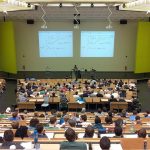As part of the international release of TIMSS (Trends in International Mathematics and Science Study) 2019 and in the context of the study’s efforts to advance the global Sustainable Development Goal (SDG) 4, monitoring progress and promoting appropriate national, regional and international tools for measuring learning outcomes, a joint report by IEA and UNESCO has been released, entitled “Measuring global education goals: How TIMSS helps”.
This joint report provides further insights on how learning assessments not only can help monitor, but also improve learning outcomes through interventions related to equity, school violence, learning environment or teacher qualifications. In addition, it shows how learning is associated with particular factors that also need to be closely monitored.
The SDGs propose a comprehensive framework to ensure that no one is left behind. SDG 4 also expresses a clear concern with the outcomes of educational processes—in terms of both effective acquisition of basic competencies as well as of relevant learning for civic participation, social and cultural life, and employment.
TIMSS is not explicitly designed to measure SDGs and therefore TIMSS data are not always an exact match for the target definition. There are, however, important overlaps between what TIMSS measures and what is included in the SDG 4. Therefore, the results of the analyses presented in the report can be considered proxy measures.
UNESCO and IEA have released this joint publication to increase participants’ understanding of TIMSS findings and their relevance for policy-making, the application of learning assessments to measure global education targets, and actions needed to translate the Education 2030 Agenda commitments into national education development efforts.
The report is available here.






